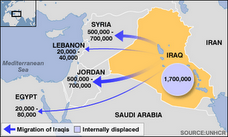Lt. Gen. Raymond Odierno said he has authorized commanders at all levels to reach out to militants, tribes, religious leaders and others in the country that has been gripped by violence from a range of fronts including insurgents, sectarian rivals and common criminals."
We are talking about cease-fires, and maybe signing some things that say they won't conduct operations against the government of Iraq or against coalition forces," Odierno told Pentagon reporters in a video conference from Baghdad.
"It's just the beginning, so we have a lot of work to do on this," he said. "But we have restructured ourselves to organize to work this issue." Odierno said it augments reconciliation efforts by the Iraqi government.
Prime Minister Nouri al-Maliki and other leaders are under increasing pressure from Washington to do more to achieve reconciliation among factions because, officials argue, no amount of military force can bring peace to the country without political peace.
Al-Maliki announced a national reconciliation proposal nearly a year ago that has made limited progress. It offered some amnesty to members of the Sunni-led insurgency and a change in a law that had removed senior members of deposed President Saddam Hussein's Baath Party from their jobs.

The State Of The Surge AL-MALIKI INTERVIEW WITH CBS NEWS, LARA LOGAN
Al-Maliki said that some of the officer corps have been creating problems and even violating the security of military operations. He stated, "I'm not afraid, but I have to watch the army, because those still loyal to the previous regime may start planning coups. Those people don't believe in democracy, and for that reason we are monitoring the status of the army very closely." Al-Maliki also insisted that his government is not ordered around by the Americans, saying, "The Americans don't order us to do this or not to do that. On the contrary, we're the ones who tell them to do this and don't do that." (Dancewater)





No comments:
Post a Comment